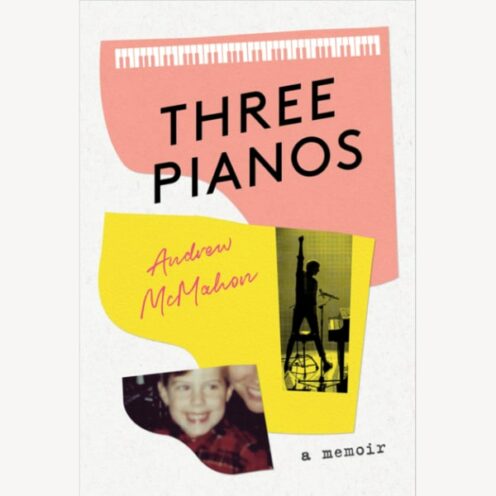
Andrew McMahon sounds like a man who’s been through some really tough situations. From a childhood filled with several moves to different parts of the country, to his dad’s battle with addiction, and his steadfast love for the music that got him through it all, McMahon crafts a tangled web of stories that he divides up into three book sections based on three pianos that have meant something to him at different points of his life and career. Three Pianos: A Memoir is a fairly quick reading experience, especially for those familiar with McMahon’s musical references in his bands of Something Corporate, Jack’s Mannequin, and lastly Andrew McMahon In the Wilderness. This only speaks to his ability as an author to convey such rich, vivid memories from an emotional standpoint that led him to be the man that he is today. As McMahon puts it in his memoir, referencing the transition between Jack’s Mannequin and the start of a new adventure in The Wilderness Years, “Starting over at twenty is easy. At thirty it’s a test of your mettle.” Battling through a leukemia diagnosis, to navigating through several starts and stops in his musical journey, McMahon never lets his difficult story seem hopeless. Instead, he provides a beacon of hope for others to keep pressing on when we reach our own breaking point.
The early chapters focus on McMahon’s tough upbringing, with the uncertainty of having to move homes nearly every year, while dealing with his own scars of being “a fat kid.” He does a nice job as an author to put his heart on his sleeve to make himself that much more endearing to those who have followed his musical career, and may not have known some of his private struggles that he outlines in this memoir. By the time he signs his first record deal with Drive-Thru Records at the ripe age of 19, Something Corporate are beginning to make a name for themselves through their steadfast dedication to winning the crowd over at each tour stop. McMahon does a nice job of explaining when the conflict within this band reaching a boiling point, without so much as pointing a finger at individuals within the group. It would be easy to “spill the tea” on why each band had its logical end, but Andrew would prefer to navigate his audience towards finding the positives in each new beginning.
From the start-up of Jack’s Mannequin in the “Piano Two” section, you could tell that McMahon looks back fondly at this section of his life as he starts to not only better connect with audiences through his music, but also begin to find love in his personal life. This could have easily been up-ended with his cancer diagnosis, but McMahon’s nature as a fighter takes center stage as he outlines in near-gory detail how he survived it all. To eventually marrying his longtime girlfriend, Kelly (whom the book is dedicated to), to the birth of his daughter named Cecilia, McMahon finds his breakthrough success in the song “Cecilia and the Satellite” under the moniker of Andrew McMahon in the Wilderness. McMahon is absolutely deserving of this success, as his songwriting chops had improved to the point of mass consumption, while still remaining authentic to who he is as a person and an artist.
This book was not quite what I was expecting when I finally got around to reading my copy that I packed along with my luggage before an airplane ride with my family for a summer vacation, but it’s a book I’m glad to have given a true chance. While some longtime fans of Andrew McMahon, and his musical projects, may wish that he would gone in more depth about the songwriting processes that outlined some of his most cherished records, this is the story that he needed to get out into the world in order for others to understand what makes him the person he is today. It’s definitely not all sunshine and happy days throughout his life, but he does lead the readers to the rainbow at the end by hoping that this latest project in Andrew McMahon in the Wilderness will be his most defining moment yet. And how can you not root for that success?